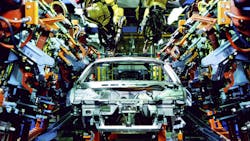If you or someone you know is still wallowing in the Dark Ages when it comes to knowing what manufacturing is or how important it is to a developed economy, new research from the Brookings Institution will help lead you to a 21st century understanding.
In its report, "America's Advanced Industries," Brookings finds that 35 of 50 "advanced industries" are -- you guessed it -- manufacturing industries, while 12 are service and three, energy.
It's music to my ears.
Long-time readers of this column won't be surprised that I endorse the report's fresh look at the economy and its conclusions. It has long been my contention that the manufacturing sector and the high-technology sector are indistinguishable; that manufacturers both drive and leverage new technology, regularly reinventing their businesses; and that investment is crucial to sustain the manufacturing sector's strength, which is critical to growing the U.S. economy.
I'm hoping this study forces them to at least rethink their tired traditional views of the manufacturing sector.
I've not been alone in this effort to convince people that manufacturing is the high-tech leading edge of our economy. But still too few public policy leaders "get" manufacturing. I'm hoping this study forces them to at least rethink their tired traditional views of the sector.
More important, this isn't an academic exercise. Even as the Brookings report recounts the significant contribution advanced industries make to our economy, it notes signs that their global competitiveness is eroding.
The Brookings report covers a lot of ground, providing "a wide angle overview of the advanced industry sector that reviews its role in American prosperity, assesses key trends, and maps its metropolitan and global competitive standing before outlining high-level strategies to enhance that."
It's important to note that the researchers didn't set out to extol the virtues of the manufacturing sector. Rather the research selected the top 50 advanced industries based on two criteria most agree are characteristics of vital, globally competitive industries: investment in R&D relative to the size of the workforce and percent of workforce requiring a high-degree of STEM knowledge. Manufacturing businesses fit the bill.
Special Report: IndustryWeek's Coverage and Analysis of "America's Advanced Industries"
Still, the report makes a point to refute outmoded characterizations of manufacturing, dismantling the old thinking that makes dubious distinctions between manufacturing vs. services, "high-tech" vs. "low-tech" and production vs. innovation.
"America's Advanced Industries" describes a new approach to identifying and describing this "distinct, yet overlooked , part of the economy -- the advanced industries." In doing so, it forcefully recasts the manufacturing sector as vital to our nation's future, not, as many think, a relic of its past.
Here's hoping it finally changes the minds of those who continue to hold outdated views of the manufacturing sector -- so we can get on with the important work of strengthening the advanced industries and our economy.
About the Author
Patricia Panchak
Patricia Panchak, Former Editor-in-Chief
Focus: Competitiveness & Public Policy
Call: 216-931-9252
Follow on Twitter: @PPanchakIW
In her commentary and reporting for IndustryWeek, Editor-in-Chief Patricia Panchak covers world-class manufacturing industry strategies, best practices and public policy issues that affect manufacturers’ competitiveness. She delivers news and analysis—and reports the trends--in tax, trade and labor policy; federal, state and local government agencies and programs; and judicial, executive and legislative actions. As well, she shares case studies about how manufacturing executives can capitalize on the latest best practices to cut costs, boost productivity and increase profits.
As editor, she directs the strategic development of all IW editorial products, including the magazine, IndustryWeek.com, research and information products, and executive conferences.
An award-winning editor, Panchak received the 2004 Jesse H. Neal Business Journalism Award for Signed Commentary and helped her staff earn the 2004 Neal Award for Subject-Related Series. She also has earned the American Business Media’s Midwest Award for Editorial Courage and Integrity.
Patricia holds bachelor’s degrees in Journalism and English from Bowling Green State University and a master’s degree in Journalism from Ohio University’s E.W. Scripps School of Journalism. She lives in Cleveland Hts., Ohio, with her family.

